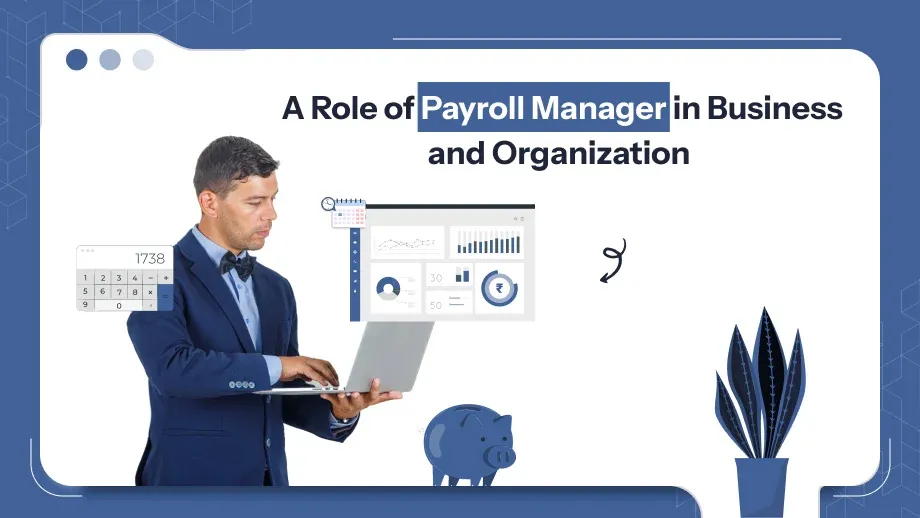
Having the proper tools, payroll management processes can present a number of difficulties. Payroll processing by hand can lead to missed deadlines, inaccurate tax returns, and misunderstandings regarding perks or deductions for many firms, especially small and small ones. As companies grow, these errors tend to multiply, taking valuable time away from your HR and finance teams.
Manual systems of payroll manager can be easily prone to human error, for example, in the input of numbers, calculation of overtime, or forgotten deductions – all of which can really pose serious compliance risks. Moreover, such mistakes have been the source of frustration and dissatisfaction among employees, who may become frustrated and leave the workplace. A Payroll Manager meaning is to automate these tasks, eliminating risk of errors while ensuring tax calculations, benefit administration, and other related services are done smoothly and accurately.
The other prominent problem that occurs when there isn’t a good payroll is staying on top of taxes and labor law changes. In general, tax codes are updated regularly and labor local laws change daily. An omission can mean huge fines and other legal consequences. A Payroll Manager will take all such changes and updates automatically so that any changes in tax and labour law are never missed again.
It thus relieved the burden from your HR, as they would have otherwise been tasked with keeping on top of frequent changes. You would also be able to create detailed reports required by auditors or tax time that save you time and hassle. Adopting a Payroll Manager, therefore, protects your business from legal risks, yet improves your operations and efficiency as a whole. This means your business can focus on growth, knowing payroll is in capable hands.
Key Skills for Payroll Manager Jobs
A Payroll Manager job requires both technical skills and leadership qualities, and also soft skills. Some of the must-have skills for Payroll Managers include the following:
Leadership and Team Management
The role of Payroll Manager demands a team, so it requires strong leadership skills, including motivating the team, delegating tasks, managing performance, and guiding the team.
Payroll processing must be very accurate, which calls for keen eyesight on detail. Payroll Manager jobs must identify anomalies in the payment of an employee, taxation, or benefit deductions.
Comprehensive Payroll Software Knowledge
The payroll manager must possess a thorough understanding of payroll software applications such ADP, Paychex is , the SAP system, and Intuit. He should be well conversant with system upgrades, troubleshooting errors, and ensuring that processing is accurate.
Tax and Compliance Know-how
Payroll Managers must understand the tax codes and deductions plus benefits as well as the rules of local, state, and federal laws dealing with payroll and labor legislation. Overtime, minimum wage, and family leave laws all fall into the realm of this knowledge.
Problem-Solving Abilities
In case of payroll discrepancies or issues, the Payroll Manager needs to address them promptly and effectively. It might involve looking into the inconsistencies in employee records, recovering missed payments, or resolving tax filing problems.
Time Management
Payroll Managers are bound by deadlines, particularly with regards to payroll processing. The pay cycles must be maintained within a specified timeframe. Therefore, time management is a very important requirement to ensure that payroll is prepared correctly and submitted well before the deadline.
Communication Skills
Payroll Managers regularly interact with HR departments, employees, and senior management. Good communication skills are important to explain payroll processes, respond to employee queries, and discuss payroll data with senior management.
Confidentiality and Integrity
Because payroll data is highly sensitive, Payroll Managers have to treat all information with the highest degree of confidentiality. Trust and integrity are the foundation to ensure accuracy and security in employee compensation records.
Discover the power of a Payroll Manager in a company.
schedule your demo today to simplify payroll and boost efficiency!
Characteristics of an Effective Payroll Manager
A robust manager is not only about making payments automatic, but also creating a total system that simplifies all kinds of payroll tasks, while ensuring accuracy and legal compliance. The right features could simplify complex processes and have a smooth error-free payroll experience.
1. Automated Tax Calculations & Filing
Making sure the tax calculation is accurate and up to date is one of the main responsibilities of a payroll manager. Different countries, states, and even cities have different taxation rules, and these laws might change often. A competent payroll manager regulates deductions and tax rates in accordance with the most current laws. This includes:
- Automatic tax calculations. It uses location, income, and tax status to calculate local, state, and federal taxes as well as more tax withholdings.
- Support for Tax Filing: The vast majority of payroll managers are able to automatically generate tax forms, such as W-2s, 1099s, or 941s, and send them to the right taxing authority.
- Real-time Compliance: With requiring manual adjustments, the system adapts to changes in tax laws and other governmental demands to maintain your company in compliance throughout all times.
2. Flexibility in Payment through Direct Deposit
Any payroll solution must focus on the capability to pay the employees on time and accurately. A contemporary Payroll Manager provides numerous payment alternatives, which can be flexible and satisfy an employee:
- Direct deposit: Through Payroll Managers, businesses can have their payments done through direct deposit, making sure the employee receives payment on time every time directly into the bank accounts.
- Multiple payment options: Some systems even allow businesses to issue paper checks, prepaid debit cards, or even pay via other platforms, depending on the preferences of the employees.
- Custom payment schedules: Whether paid weekly, bi-weekly, or monthly, the Payroll Manager can easily accommodate different pay cycles.
3. Employee self-service portal
Transparency and accessibility are something that keeps the employers along with employees in trust together with communication. A self-service portal empowers employees by providing simple access to their payroll information:
- Pay Lips and Tax documents: Workers have real-time access to their pay stubs, yearly W-2s, 1099 forms, and other crucial tax-related papers.
- Updates to Personal Data: Workers can make changes to their personal information without consulting HR, including banking information, address changes, or tax withholding details.
4. Compliance Management & Reporting
The biggest challenge businesses face is the changing labor laws and tax regulations in payroll management. A good Payroll Manager ensures compliance in the following ways:
- Automatic updates with regard to labor laws so that the payroll software could reflect the latest changes as it occurs in tax laws, labor regulations, or legal requirements.
- Audit Traces: To guarantee transparency and serve as a crucial backup in the event of disagreements or audits, all payroll transactions are documented and kept up recent with thorough audit trails.
- Real-Time Reporting: Companies may monitor payroll trends, keep tabs on their financial status, and get prepared for the payroll taxes season by using the software’s ability to generate precise payroll reports instantaneously.
- Customizable Reports: A business can produce detailed reports on employee earnings, taxes, deductions, benefits, overtime, and much more. These reports can be made customizable for accounting, auditing, or tax filing purposes.
5. Time and Attendance Integration
Businesses that have people working hourly or have really complex payroll structures need this integration of time tracking and attendance features. A good Payroll Manager should seamlessly integrate with other time and attendance systems. This means to streamline a payroll process:
- Automated Time Tracking: The employee clocks in and out through any available tools: biometric scanners, web-based apps, or even physical time clocks. Then, automatically, the system tracks working hours.
- The overtime calculations are automatically done by the software based on predefined rules, ensuring that labor laws are followed.
- Absence Tracking: Integrated attendance systems allow for the automatic deduction of unpaid leave or tracking of paid time off, sick days, and vacation days.
6. Customization of deductions and benefits administration
Employee benefits and deductions can be very variable according to the individual and the business. A flexible Payroll Manager duties allows the businesses to customize deductions and benefits to suit their specific needs:
- Employee Deductions: Taxes, insurance premiums, retirement contributions, union dues, and any other predetermined deduction are routinely subtracted by the system.
- Payroll Software administers the following: health insurance and commissions, bonuses, pension, and 401(k) retirement plans with information on each employee’s eligibility and amount.
- Flexible Contributions: Allows the employees to make contributory, voluntary contributions to their benefit or retirement plans while assuring all contributions are made automatically.
7. Scalability & Multi-Currency Support
As your business grows, so should your payroll system. An efficient Payroll Manager should scale along with you, with flexibility for handling higher numbers of employees or a number of locations. Here are the key features:
- Multiple Locations/Departments: The capacity to handle payroll at different offices or branches having their respective tax rates, benefits structure, and rules for payroll.
- Multi-Currency & Global Compliance: For global teams, multi-currency support means payroll can be processed in different currencies, ensuring compliance across the globe.
- Automated Pay Adjustments: Companies with more complex compensation structures allow the Payroll Manager to automatically perform adjustments on pay raises, bonuses, or commissions.
Benefits of Using a Payroll Manager
A Payroll Manager is much more than a tool to manage employee payments. It is a complete solution that not only improves the efficiency and accuracy of business but also ensures better overall operation effectiveness. With the help of automatic and streamlined payroll processes, businesses can gain numerous advantages beyond just on-time and accurate payments. Let’s break down the main benefits into detail:
1. Cost Savings
One of the most appealing reasons to invest in a Payroll Manager is the possibility of cost savings. Manual payroll processing and older, outdated software systems tend to result in costly mistakes in the form of late payments or even fines for noncompliance. Mistakes that happen through manual payroll processing, ranging from incorrectly calculated taxes to missed deadlines, can create penalties and back payments as well as disgruntled employees. Besides the time of HR teams getting waste in fixing error and/or manual wages is getting an opportunity, such important skill money also may remain futile since one may divert valuable resources or other strategic works of organizations
2. Enhanced Productivity of Employees
Through deployment, Payroll Manager removes most of the mindless monotonous work which usually comes during payroll time-employee, pay and its accuracy assurance from HR groups’ responsibilities. More focused tasks relating to company success can occupy their hands during those tasks. For instance, your HR team can focus more on employees’ satisfaction, better strategies to retain employees, and an ideal company culture. In brief, the automation of payroll can enable your team to get things done more efficiently in order to increase overall employee productivity and allow HR skills and professionals to be able to contribute to the business more meaningfully.
3. Scalability
Payroll Manager is designed for your business to scale along with it. Whether you are hiring more employees, expanding to new locations, or introducing new compensation structures, a Manager can accommodate your evolving payroll needs. It can handle an increased number of employees without requiring significant additional resources, and it can support multiple locations or branches, each with its own specific payroll rules. These measures ensure your payroll system automatically maintains efficiency along with the rapid growth in your business that reduces complexities.
4. Greater Flexibility Regarding Report Presentations
All the above reports can be elaborated into detailed breakdowns of wages, taxes, benefits, bonuses, and all possible deductions. The format allows analysis with ease. Real-time analytics offer management the resources for making data-driven budgeting decisions on financial planning and resource allocation. For instance, if one is to understand what their payroll costs are, it could mean adjusting a business’s compensation strategy for competitive positioning, allocating better resources, or planning future growth.
5. Minimal Errors and Risks
Mistakes in payroll processing can have serious consequences. From dissatisfied employees to costly fines for non-compliance, the list goes on and on. Inaccurate tax calculations, missed overtime, incorrect deductions, or even overlooked benefits can create major headaches for businesses and damage the trust of employees. These mistakes also lead to compliance issues and audits or even legal actions, especially when it has to do with tax laws and employment regulations.
How to Pick the Best Pay Administrator for Your Company
Take into account a few important aspects while selecting a payroll manager:
- Ease of Use: Your HR team will quickly adopt an interface that is easy to use.
- System the integration process: It ought to work well with your time-tracking, HR, and accounting software.
- Protection: To protect sensitive employee data, the payroll manager should have robust security measures in place.
- Customer Support: If you encounter difficulties or require assistance in setting it up, a responsive support team must be there.
Typical HR Issues Resolved by Payroll Managers
Payroll administration poses difficulties for even the most well-meaning companies. The following describes the way a payroll manager responsibilities handles typical payroll problems:
1. Manual Entry Errors
Manual entry of hours worked, tax calculations, and benefits can lead to errors that result in costly fines or frustrated employees. A Payroll Manager automates calculations and eliminates manual data entry errors.
2. Compliance Complexities
Payroll compliance is a moving target with changing tax rates, labor laws, and reporting requirements. The Payroll Manager will keep your business in compliance, no matter how frequently that changes.
3. Inconsistent Payment Schedules
Dissatisfaction and turnover may result from irregular payroll or late payments. Using a direct deposit or other preferred payment methods, a payroll manager makes sure that employees are always paid properly and on time.
4. Lack of Transparency
Employees may ask about the pay, benefits, or deductions. A Payroll Manager gives them access to pay stubs, tax documents, and benefit information themselves, which increases transparency and lessens HR queries.
Conclusion
A Payroll Manager is an important tool of businesses that aim to make payroll practices more efficient, errorless, and compliant. Through payroll automation, it has saved time, minimized risk, and ensured increased employee satisfaction. Being scalable with accuracy and reporting, this Payroll Manager helps achieve business growth and reduce admin costs. When workers are paid on schedule and appropriately, the organization’s morale and trust are raised. Managing your business’s compliance with ever-changing tax laws and regulations helps you stay out of trouble with the government and avoid costly fines. Ultimately, it provides a more reliable and efficient payroll solution, allowing businesses to zero in on their core skills and drive growth in the future.









